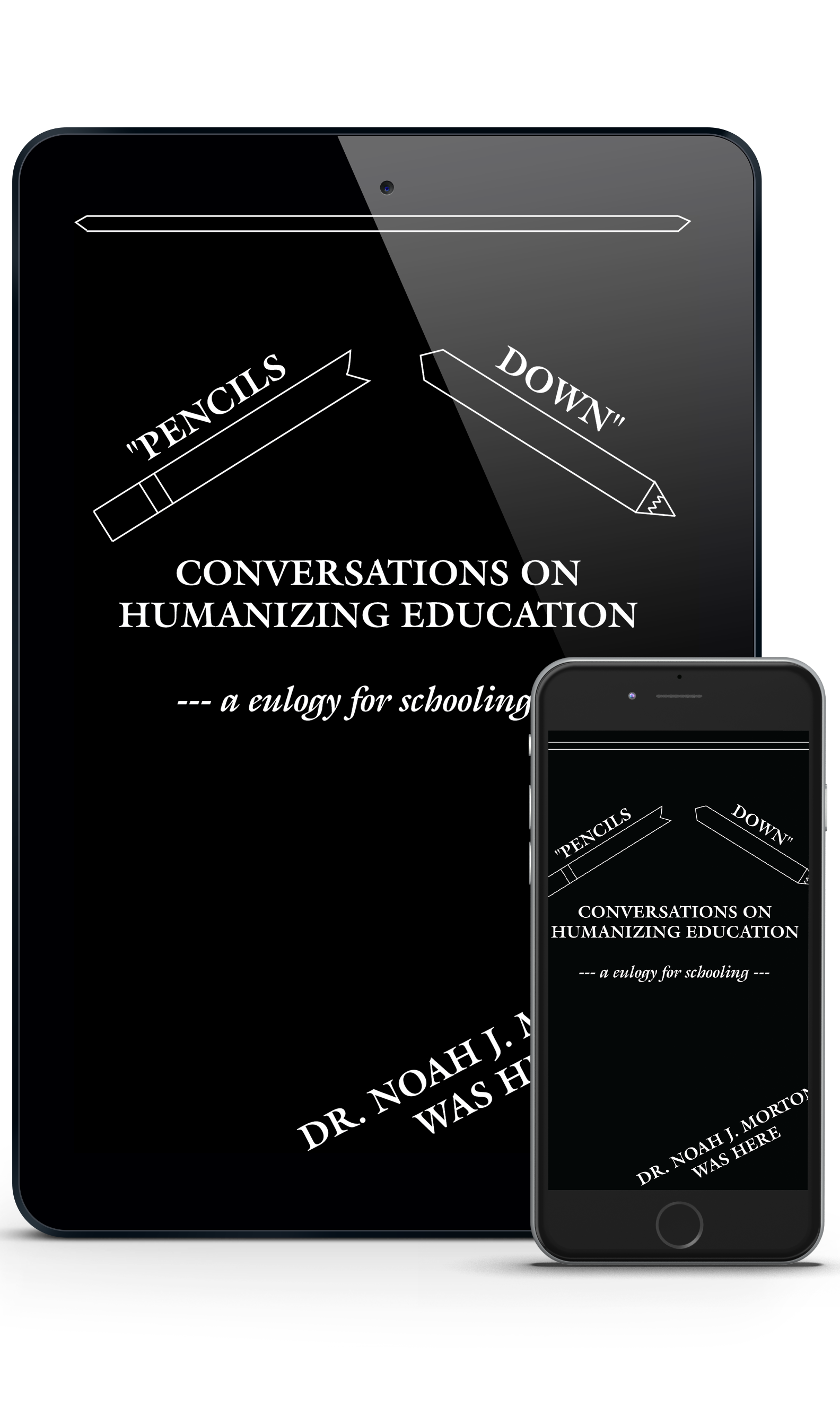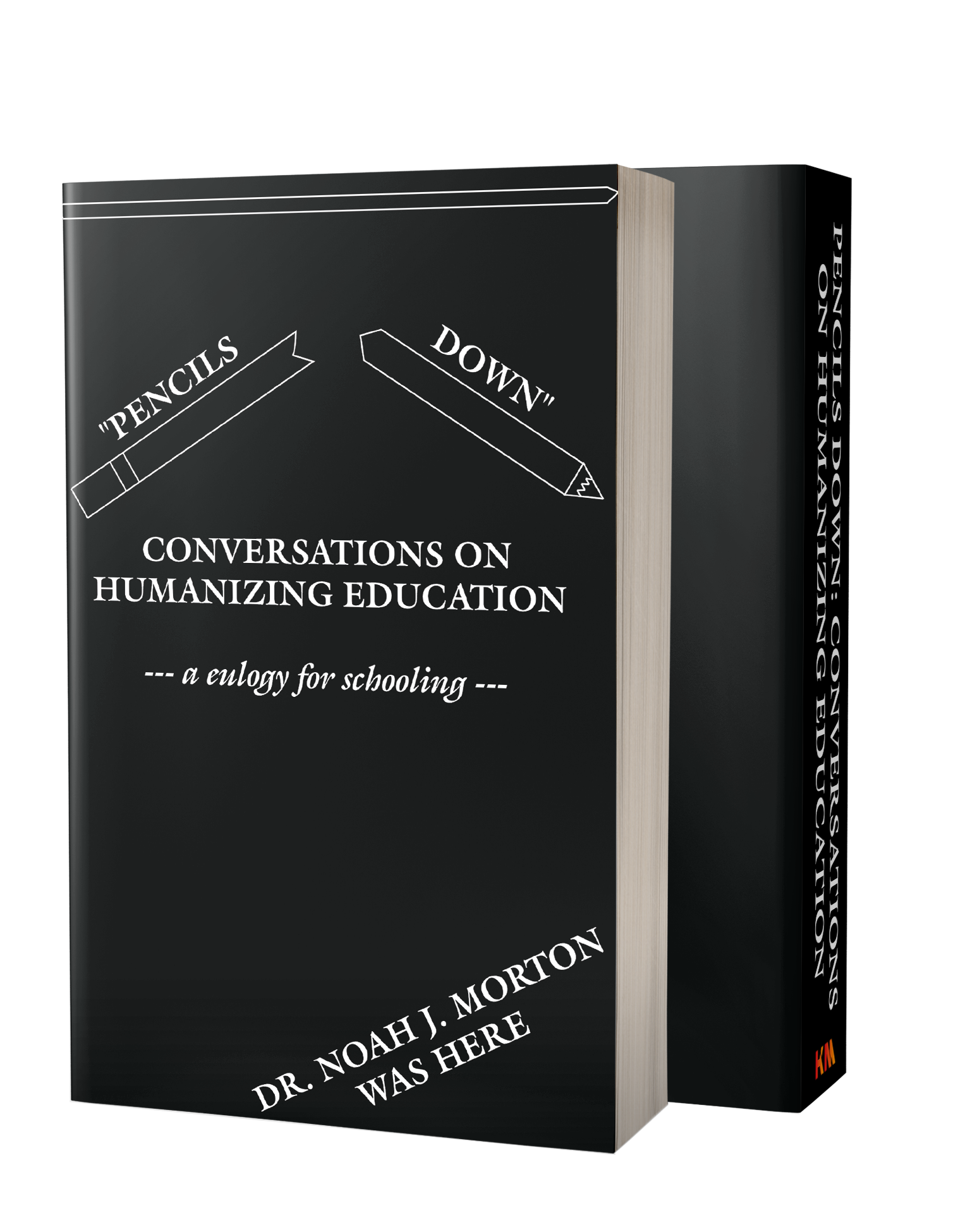Kulshi Mumkin®, LLC
- Projext Archive --->
- noahmorton
"Pencils Down:" Conversations on Humanizing Education
---a eulogy for schooling---
12 Parts | ~60,000 words | 192 pages | 5.5” x 8.5” | Open Access (and/or $20 suggested contribution)
Pencils Down: Conversations on Humanizing Education is a mediation on the realities of schooling and education in residence time,
which is now. Residence time refers to "the amount of time it takes for a substance to enter the ocean and then leave the ocean.
"everything is now" (Sharpe, 2016, p. 41). In other words, residence time refers to the moment of singularity in the afterlife of
Human blood…has a residence time of 260 million years. We, Black people, exist in the residence time of the wake, a time in which
slavery, which is the "racial calculus and . . . political arithmetic that were entrenched centuries ago —skewed life chances, limited
recognize our relationships with critical theories of coloniality in education, decolonial pedagogies, and education as the practice of
access to health and education, premature death, incarceration, and impoverishment" (Sharpe, 2016, p. 15). It is now that we pause to
freedom. These relationships with theory are "nothing new" as we engage in the genealogy of liberation struggles.
With our relationship with theories, we read the world and ideas that are consistently placed in detention in mass schooling complexes.
Thus, "reading in detention," we recognize, to make known again, schools as dehumanizing, detention spaces; creation of "human" enmeshed in
Eurocentric colonial thought; and the importance of recontextualizing "human" as relational rhizomes to engage in conversations on humanizing
education that do not reinscribe coloniality. The combination of the relationship with theories and reading in detention, we continue with
our "methodology" — conversations as anachoreographies to move beyond the dominant choreography of colonizations.
Our conversations as anachoreographies open the possibility for us to sample and remix (rethink) temporalities with conversations on humanizing
education with 40+ guest speakers, who are artists, poets, activists, musicians, scholars, and avatars. The conversations are written in a
screenplay/talk show format that involves three core concepts: (1) revisiting decolonization; (2) organized crime and the relations of power that
fuel settler colonialism as well as schooling; (3) weather report of antiblackness that continue to position Blackness away from the possibility of
humanity (thus, humanizing education is implausible). These conversations further elaborate on the nuances (movements) in the anachoreography.
Closing the eulogy for schooling (since schools are dead), we open with sketching an education not confine to humanization to recognize and
encourage some of the possibilities of education in residence time, which is now.
Conversation Flow (Outline)
Graphic Overview of "Pencils Down"Scenes from Black Board: A Prelude
scene one: a classroom somewhere in America
scene two: another classroom
scene three: an auditorium
scene four: somewhere
"Pencils Down:"An Invitation to Pause
Pause to remember
Pause (noun): a moment of respite or rest
Pause to aspire (as in to breathe)
Pause to bear witness
Pause to question
Pause (forget the infinitive of "to something" – just pause)
Pause to engage in conversations on humanizing education
an offering: conversations on humanizing education
THEORETICAL TOOLS: Relationships with Theories
"Nothing New" – saving souls and colonizing minds (coloniality in education)
"Nothing New" – petrifying knowledge and personifying statues (decolonial pedagogies)
"Nothing New" – transgressing education and practicing freedom (transgressing education as the practice of freedom)
LITERATURE REVIEW: Reading in Detention
Detention Rm. 304: schools as dehumanizing, detention spaces
Detention Rm. 406: partying on the WEEKEND, remembering CHILDHOOD, and creating HUMAN #theususal
Detention Rm. 201: recontextualizing human as relational rhizomes
METHODS: "Goofing Off"
conversations as anachoreography
tale of two photographs
finding the others
so…what are we doing? – anachoreographic conversations "at play"
a quick note on time"
{an errant reminder to pause}
FINDINGS: Remixing and sampling conversations
conversations on "humanizing" education
mosaics and beat making — sampling and remixing
brief comment on conversation structure
Show notes: "decolonization re:"
S2E3: decolonization re: (in medias res after introductions)
Core Concept #1: three types of colonialism (external, internal, and settler)
Core Concept #2: decolonization is INCOMMENSURABLE (not only a metaphor)
Core Concept #3: un-colonial emerges to describe unraveling coloniality in education
rolling credits (decolonization re:)
Show notes: "organized crime"
S4E5: organized crime (settler-native-slave triad and schooled student-push out-delinquent syndicate)
Core Concept #1: colonialism as technology and
Core Concept #2: settler-native-slave triad is remixed in schools as schooled student-push out-delinquent syndicate
Core Concept#3: first, second, and third worlding universities is re-mixed to primary schools, secondary schools, and post+secondary schools
rolling credits (organized crime)
Show notes: "weather report"
S3E2: weather report (it's anti-black)
Core Concept #1: the "watch" as a technological tool of anti-blackness
Core Concept #2: anti-blackness as the weather
Core Concept #3: uncovering the conspiracy in talk with teachers
rolling credits (weather report)
SKETCHING: a "not human" education
RESOURCES
Kulshi Mumkin®, LLC Open Access Statement – Please Read
This book is open access. This work is not simply an electronic book; it is the open access version of a work that exists in a number of
forms, the traditional printed form being one of them.
Most Kulshi Mumkin®, LLC publications are placed for free, in their entirety, on the web. This is because the free and autonomous sharing
of knowledges and experiences is important, especially at a time when the restructuring and increased centralization of book distribution as well
as academic ivory tower of paywalls makes it difficult (and expensive) to distribute radical texts effectively. The free posting of these texts does not
mean that the necessary energy and labor to produce them is no longer there. One can think of buying physical copies not as the purchase of
commodities, but as a form of support or solidarity for an approach to knowledge production and engaged research (particularly when
purchasing directly from the publisher).
The open access nature of this publication means that you can:
- read and store this document free of charge
- distribute it for personal use free of charge
- print sections of the work for personal use
- read or perform parts of the work in a context where no financial transactions take place
- gain financially from the work
- sell the work or seek monies in relation to the distribution of the work
- use the work in any commercial activity of any kind
- profit a third party indirectly via use or distribution of the work
- distribute in or through a commercial body
Support Kulshi Mumkin®, LLC/ Purchasing Books The PDF you are reading is an electronic version of a physical book that can be purchased through Kulshi Mumkin®, LLC directly. Please support this open access publication by requesting that your university or local library purchase a physical printed copy of this book, or by purchasing a copy yourself.
If you have any questions please contact the publisher: [email protected]
***adapted/cited from Minor Compositions
Digital Version

PDFs will be immediately available for download after checkout,
and an email will also include the download link. All orders are
delivered via Payhip, and purchasing details are processed through
our own Stripe account.
Print Version

Please note: We currently do not carry any stock. If you want a print edition, you can support this publication by
purchasing and/or requesting your local library/university to purchase print copies for community edition. The cost will be
determined mainly by print and shipping expenses. Please note, due to the price of printing, we only offer print for bulk
purchases (min 25 copies), which can be shared in community. Please contact us if interested.